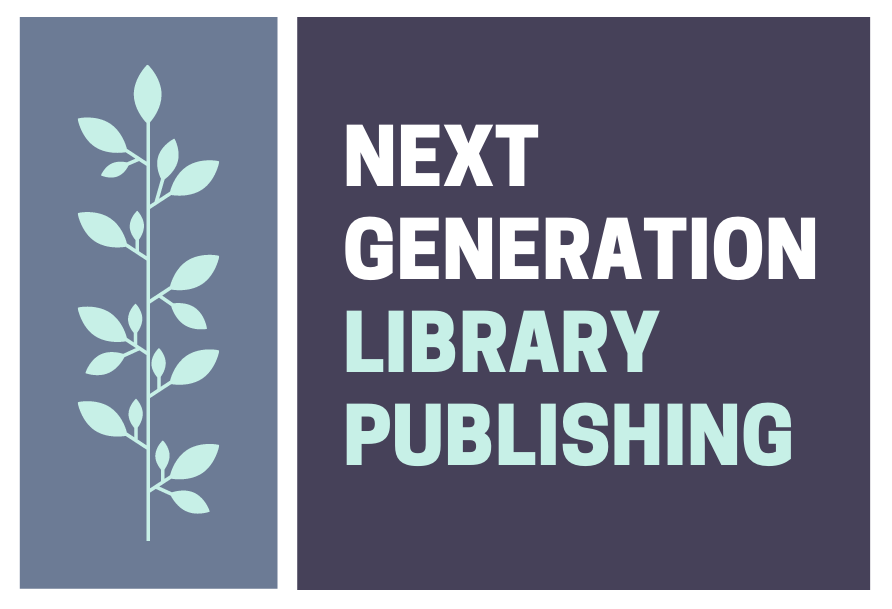News and Perspectives
Next Generation Library Project Makes Progress Toward Shared Open Publishing Infrastructure
NGLP was recently featured on the SPARC blog in a profile that highlights our efforts to “create a robust, values-driven, and community-led system to share knowledge.”
New article: “Accountability in the knowledge commons: lessons from Next Generation Library Publishing and the 2022 Values and Principles Summit”
NGLP product owner, Sarah Lippincott, and co-PI Katherine Skinner have published a new article discussing the centrality of assessment and accountability mechanisms in governing an equitable and sustainable knowledge commons.
Scaling Diamond OA: Universities as Centers of Open Publishing Excellence
From the Budapest Open Access Initiative 20th anniversary recommendations to the UNESCO Recommendation for Open Science and the Harvard endorsement of Diamond OA, many recent reports on open scholarship are calling for scholarly research to be published and disseminated via open infrastructure that is community-owned and -governed. This call for open infrastructure is particularly important in light of the recent White House (OSTP) memo on equitable access to research, which is likely to result in a massive wave of open research publications.
From Vision to Reality: Bringing Resilient Open Source Infrastructure to Library Publishers
The Next Generation Library Publishing project is building a sustainable open source alternative to commercial publishing platforms, expanding choices for values-driven publishers of all sizes. We are on the brink of realizing our vision as we move the pilot implementations of our software stack into production-ready service offerings.
Migration is the Hard Part
In scholarly communications, when we talk about “vendor lock-in”, what we actually mean is the difficulty (or seeming impossibility) of moving from one platform to another: “migrations.” This can be technical. Platforms may not provide data export in a standardized format or there may be no tooling to complete the migration automatically. Lock-in can also be social, though. If the terms of the platform take coercive IP ownership of the data put into the platform, then it can also become impossible to move from one space to another.
New article explores “the conscious pursuit of interdependence” in scholarly publishing
The NGLP team is pleased to announce publication of “Bundle of Sticks” and the Value of Interdependence: Building a Tools and Services Collective, a new article in the latest issue of the Journal of Electronic Publishing.
Longleaf Services: Building Consortial Journal Publishing Models that Empower Libraries as an NGLP Pilot Partner
Established in 2006 as a division of The University of North Carolina Press, Longleaf Services has built a strong reputation as a mission-aligned collaborator for the university press community, offering a suite of services for small publishers that take advantage of the Press’ expertise and economies of scale. As an NGLP pilot partner, Longleaf Services will explore how to bring scalable and efficient publishing services to library publishers–including libraries looking to build new programs from scratch.
Next Generation Library Publishing and Janeway Systems Launch Pilot with Five Library Publishers
Library-based publishers at the Claremont Colleges, Clemson University, the University of Arizona, the University of New Orleans, and the University of Massachusetts, Amherst, will test the Next Generation Library Publishing (NGLP) project’s open source infrastructure as part of a pilot launching this month. The pilot, led by Janeway Systems, will provide a turnkey solution that combines journal and IR publishing with end-to-end services, empowering library publishers to grow their programs through open source software tailored to their needs.
NGLP March Community Forum Recording Available
On Thursday, March 10th, the Next Generation Library Publishing project hosted its second Community Forum, presented by principal investigators Katherine Skinner (Educopia), Kristen Ratan (Stratos), Catherine Mitchell (CDL), and NGLP product owner and co-author of the FOREST Framework for for Values-Driven Scholarly Communication, Sarah Lippincott.
The forum introduced the latest iteration of the FOREST Framework, the values-driven approach that provides the foundation for NGLP’s work in transforming the scholarly publishing landscape.
This Forum also marked the official launch of the NGLP pilots, three test implementations of NGLP’s modular software that bring our code to life and provide an on-ramp for widespread adoption.
NGLP Releases “Growing a FOREST, Values-Aligned Approaches to Transformative Scholarly Communication”
Our newest publication, Growing a Forest: Values-Aligned Approaches to Transformative Scholarly Communication, provides a detailed account of NGLP’s second-year accomplishments, outputs, and increasing impact and describes in depth the values-based framework through which we approach our work.
California Digital Library: Prioritizing Community and Sustainability as an NGLP Pilot Partner
In order to engage more directly in community-led, open source platforms for journal and IR workflows, where the work of maintaining and even advancing the systems is shared among a broad set of stakeholders, this spring CDL will launch its pilot of an NGLP library publishing solution.
Collective Stewardship of Open Infrastructure for Library Publishing: A Framework for Cooperation
The Next Generation Library Publishing project (NGLP) is committed to empowering library publishers through a combination of technical solutions and values-driven infrastructure. We believe that new software alone can’t create large-scale and lasting change. In order to make our open source software (OSS) accessible to libraries at all scales, and to ensure it aligns over the long term with academic values, we also need values-based approaches to stewardship and deployment. To this end, NGLP has convened a working group that assembles software developers, potential service providers, and library publishing advocates to strategize collaborative maintenance of NGLP’s software components and build sustainable services around them.
Building Community through Transparent Open Source Development
In October, the Next Generation Library Publishing project hosted its first Community Forum, presented by principal investigators Katherine Skinner (Educopia), Kristen Ratan (Stratos), and Catherine Mitchell (CDL). The forum introduced NGLP’s holistic approach to empowering library publishers and provided progress updates through the lens of the project’s guiding questions.
Next Generation Library Publishing Project Announces Partnership with Janeway
Janeway will join the California Digital Library and Longleaf to pilot three different service models for the software components developed through the Next Generation Library Publishing project. Martin Paul Eve, Professor of Literature, Technology and Publishing and an instigator of the Janeway project said: “We are delighted to be participating in the Next Generation Library Publishing project. It’s clear that the international library publishing community needs a set of modern tools that are up to the task of the contemporary environment and that meet the highest standards of interoperability. By working with NGLP we hope to embed community interoperability needs into our openly developed and community-centered platform.”
A Strengths-Based Approach to Evaluation and Transformational Change in Publishing
When Katherine Skinner and I published the Values and Principles Framework and Checklist last year, we introduced them as mechanisms to hold actors in the scholarly communication system accountable to their stakeholders and demonstrate their commitment to openness in concrete and documentable ways. We conceived the framework and checklist as living, iterative, and adaptable documents. Our first major revision, to be released this fall, reflects a deliberate shift to a strengths-based model of evaluation and change.















